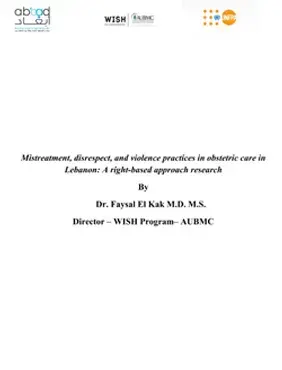Obstetric violence is a serious issue that affects women all over the world. It refers to any act or
omission by healthcare providers that results in physical or psychological harm or suffering to
women during pregnancy, childbirth, or the postpartum period. In recent years, there has been
growing recognition of obstetric violence as a global issue, with studies conducted in various
countries highlighting its prevalence and impact on women's health and well-being.
Lebanon, like many other countries, has seen its share of cases of obstetric violence. Unfortunately,
due to a lack of research on this topic in Lebanon, the true extent of the problem is not known.
However, anecdotal evidence suggests that women in Lebanon have experienced mistreatment and
abuse during pregnancy and childbirth.
Therefore, a study on obstetric violence in Lebanon helps shed light on this important issue and
raise awareness about the need for better protection and care for women during pregnancy and
childbirth.
The current study involved conducting interviews with maternal healthcare providers in Lebanon
as well as focus group discussions with pregnant women or women who gave birth in the past one
to three years to explore their attitudes, perceptions and experiences regarding obstetric violence,
mistreatment and abuse across pregnancy and childbirth. The study also explores the factors
contributing to obstetric violence in Lebanon, such as cultural norms, gender-based discrimination,
and inadequate training and resources for healthcare providers.
The findings of this study could be used to inform policy and practice, helping to improve the
quality of maternal healthcare in Lebanon and ensure that women receive the respectful and
compassionate care they deserve. Moreover, it could contribute to the global conversation on
obstetric violence and help to promote a culture of human rights and gender equality in the field
of maternal health.
Mistreatment, disrespect, and violence practices in obstetric care in Lebanon: A right-based approach research

Publisher
Number of pages
24
Author
UNFPA Lebanon
Publication
Mistreatment, disrespect, and violence practices in obstetric care in Lebanon: A right-based approach research
Publication date
31 March 2023

